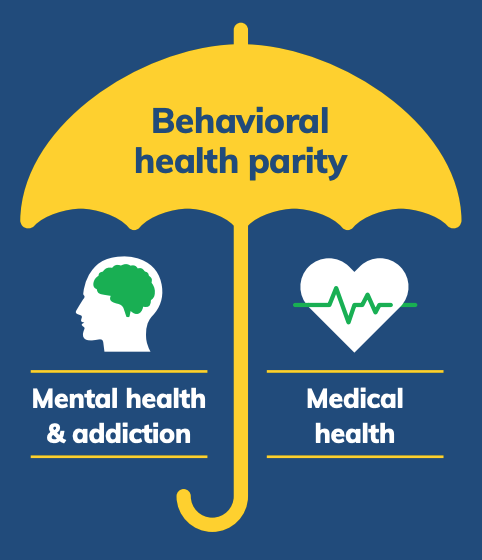- Home
- >
- The Mental Health Parity...
The Mental Health Parity Act
Behavioral health is another way to say mental health and substance use. Behavioral health parity means that health insurance covers substance use and mental health conditions and services in an equal way compared with other kinds of health conditions and services.
We all know someone who has faced mental health or addiction challenges. It’s more and more common these days. With support from loved ones & access to affordable care, young people and adults can recover and lead full, healthy lives again. One in five Georgia adults and one in six Georgia adolescents have mental illness or addiction. (KFF)
Unfortunately, far too many Georgians do not receive the mental health and substance use treatment they need because of unfair health insurance coverage, which makes people jump through hoops to get treatment, wait too long to see a provider, pay too much for care, or be denied care altogether.
-
- Georgia ranks 48th in access to mental health care. (Mental Health America)
- Half of Georgia adults reporting unmet MH treatment needs say that cost was the reason they did not receive care. (KFF)
Georgia lawmakers are currently debating a bill that could resolve some of these problems. It's called the Georgia Mental Health Parity Act. Here is a fact sheet about the bill.
The Mental Health Parity Act is landmark legislation that will improve access to mental health and substance use disorder (MH/SUD) treatment for all Georgians. The bill will strengthen and grow the existing mental health infrastructure in the state by:
- Requiring private and public health insurers to provide coverage for MH/SUD the same as they cover physical health services. Covering MH/SUD services just as physical health services is referred to as “mental health parity.”
- Creating a way for consumers to file complaints with the state if they believe they have experienced an unfair denial of MH/SUD coverage.
- Require insurers to submit data to the state that proves they are covering MH/SUD just the same as physical health.
- Encouraging students to enroll in MH/SUD professional training programs by allowing for the cancellation of student loans for those programs.
- Removing the requirement that a person who is experiencing a mental health or substance use crisis be in the process of committing a crime for law enforcement to transport that person to emergency crisis treatment
- Increasing access to trained professionals who have undergone treatment for a mental health or substance use disorder and successfully recovered, known as Peer Support Specialists
- Directing the state to develop and implement a solution for better care coordination for children with MH/SUD that are frequently in the ER for a crisis
- Requiring Medicaid insurers to spend at least 85% of their profits directly on services for members, rather than things like marketing materials or administrative costs
